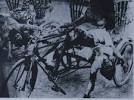Nation recalls today horrors of March 25 Mass graves gradually vanishing
The nation recalls today the horrors of one of the worst genocide in modern history committed by the Pakistan occupation army against unarmed people of the then East Pakistan on the night of March 25, 1971, while many mass graves are gradually shrinking into oblivion due to lack of preservation. The crackdown on unarmed Bengalis on the night of March 25 set off the nine-month War of Independence led by the Mujibnagar government in exile which ended with the emergence of independent Bangladesh on December 16, 1971. On this night 44 years back, tanks of the occupation army rolled out of Dhaka cantonment and a sleeping city woke up to the rattle of heavy weapons fire. The marauding Pakistani troops attacked halls of residence at Dhaka University, the then East Pakistan Rifles headquarters at Peelkhana and Rajarbagh Police Lines as part of its infamous ‘Operation Search Light,’ killing several thousand unarmed Bengalis on that night. Just before the operation, the Pakistani military rulers arrested Sheikh Mujibur Rahman, the then undisputed leader of the Bengalis, later the founding president of Bangladesh, at his Dhanmondi house in Dhaka.
During the War of Independence, the Pakistani occupation forces and their local auxiliaries – Razakar, Al-Badr and Al-Shams – carried out pogroms and genocide across Bangladesh. Many martyrs were buried or dumped in killing fields or in mass graves. Many bodies were thrown in marshes, canals and rivers and some were burnt alive. The liberation war affairs ministry officials have identified 204 mass killing fields and mass graves, while private organisations and war researchers put the number between 1,000 and 5,000. Most of the 204 killing fields and mass graves listed by the government are left uncared for without any plaques and monuments to preserve the memory of the people martyred during the war, while a 2010 project proposal for building memorials or mausoleums at the places is gathering dust at the Planning Commission, a ministry official said. ‘We hope for the approval for the project soon,’ said liberation war affairs ministry deputy chief Mosarraf Hossain, who is dealing with the project proposal for the ministry. Liberation War Museum listed 467 killing fields and mass graves across the country. A Muktijuddha Kosh volume on the independence war has listed about 1,000 mass graves and killing fields, said Muntassir Mamoon, who edited the series.
According to War Crimes Facts Finding Committee, Bangladesh, there are over 5,000 mass graves and killing fields and it has identified more than 940 such spots many of which have become unmarked. ‘As there are no memorials, lands of many killing fields and mass graves have been grabbed with structures raised and roads built on them. Many such sites cannot be traced anymore, facts finding committee convener MA Hasan said. Many such fields in the capital, including Shialbari, Government Bangla College, Harirampur and Muslimbazar at Mirpur, Government Physical Education College, Mohammadpur Thana Uttar Simanta and Adabar at Mohammadpur, were found uncared for and even without plaques or monuments. A road has been constructed through the killing field at Loharpul in Sutrapur area. A city corporation office building has been constructed on the killing field at Dhalpur and a fish market replaced killing field at Thatharibazar. The National Institute of Mental Health stands on a killing field at Sher-e-Bangla Nagar.
The hostel for members of parliament at Pashchim Nakhalpara was also a place of torture and killing. These sites were also found to remain without being demarcated or any memorial erected there although the High Court on July 8, 2009 asked the government to set up a committee to identify and preserve all the mass graves and other locations connected to the war of independence by raising monuments. ‘It is the time for the authorities to take steps to conserve the places,’ said liberation war researcher and historian Abu Mohammad Delwar Hossain. Different political and socio-cultural organisations and educational institutions have taken elaborate programmes to mark the March 25 in the city and elsewhere in the country. Dhaka University would hold a candle lighting programme at Jagannath Hall at 11:59pm, after holding programme of patriotic songs and poetry recitation from 6:00pm. Ekattorer Ghatak Dalal Nirmul Committe, will light 44 candles at the Central Shaheed Minar at 8:00pm. The Bangladesh Police would pay homage to the policemen, who laid down their lives while putting up heroic resistance against the occupation army, by lighting candles at 11:00pm. Liberation War Museum will hold a cultural programme and light candles at its premises at 6:30pm. Many other organisations including Ekattorer Ghtak Dalal Nirmul Committe and Sector Commanders Forum have taken separate programmes to mark the day.
- See more at: http://newagebd.net/106147/nation-recalls-today-horrors-of-march-25/#sthash.fePIGOUP.dpuf











